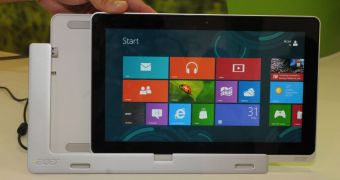Back in the seventies and the eighties, Microsoft and Intel rose above everyone else who wanted to make personal computers, through the so-called Wintel alliance, but this dominance isn't on safe grounds anymore.
Intel and Microsoft never let their product lines and technologies lag, or wane. This would, normally, be enough to maintain the dominance forever.
Unfortunately for the two, even they can't keep their footing when the ground beneath them, the foundation, starts shaking and changing.
This is what seems to be happening, now that previously inconsequential factors, like ARM and its partners, and Google and its backers, have spread their own spheres of influence.
Long story short, smartphone, tablets and other small devices are being adopted by millions of people. And since their specs and features are high enough for web browsing and high-quality multimedia, PCs aren't indispensable all of a sudden.
“With smartphones and tablets performing tasks previously exclusive to PCs, the computer market has expanded to include other platforms. As a result, Wintel finds itself in the unfamiliar position of dancing to someone else’s tune, following standards that were set by other companies for form factors, user interfaces and even pricing,” said Craig Stice, senior principal analyst compute platforms at IHS.
Back in 2011, Microsoft's share of the operating system market was of 44%, with Linux and Android owning most of the rest. By 2016, though, IHS iSuppli thinks the percentage will fall to 33%.
On a similar note, Intel's microprocessor share will fall from 41% to 29%, even though the total size of the market will double by that time. Tablets (311 million units) will almost match the mobile PC segment (322 million) while smartphones will jump to 655 million or so.
“The smartphone influenced the tablet, the tablet influenced the PC, the PC wants to become more like a tablet and the tablet more like a PC. The Wintel camp is not accustomed to following, but with both companies being excluded of the two fastest-growing markets, they are in catch-up mode,” Stice said.

 14 DAY TRIAL //
14 DAY TRIAL //